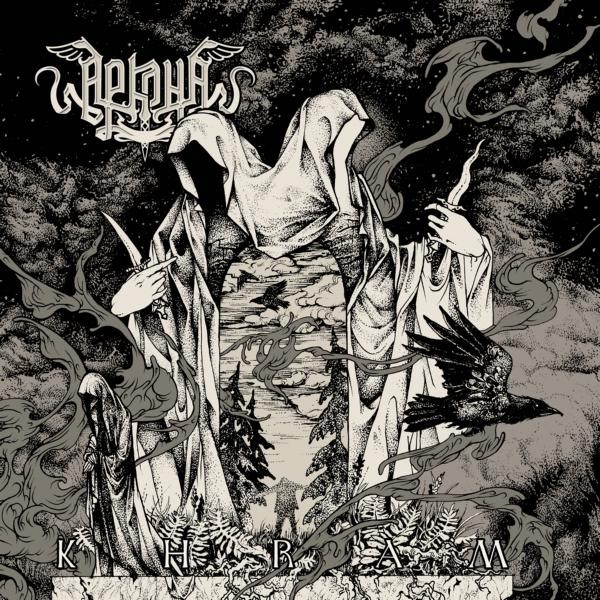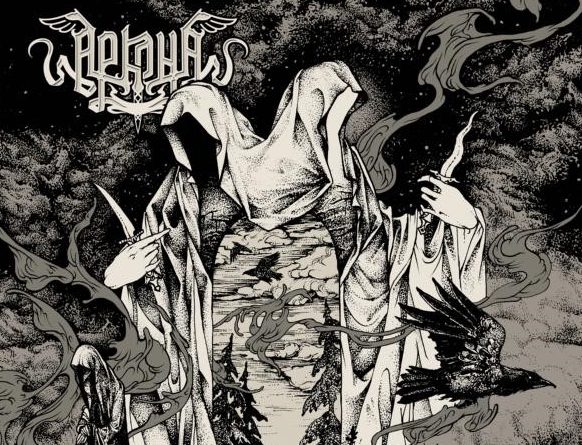ALBUM REVIEW: Khram – Arkona
Russia’s pre-eminent blackened pagan metal group ARKONA are opening 2018 with a ferocious black metal assault. Khram (Temple) is their eighth studio album, and represents a generous helping of more of their unique sound.
Most noteworthy is Tseluya zhizn’ (Kissing Life). An impressive opus, it comes in at just over 17 minutes, making it the longest song in their discography. Its length is also its downfall, as is its placement in the running order. It is too directionless a song to be as long as it is: it doesn’t build to anything significant, but feels like an extension of one of their standard songs with some lengthier instrumental sections thrown in for good measure. ARKONA are not MOONSORROW – the latter put out sweeping epics masquerading as songs, whereas ARKONA are more renowned for songs like Stenka na Stenku or Liki Bessmertnykh Bogov; shorter and sharper, more focused on the elements of pagan-folk music that can be brought into black metal. This is not to say it’s a bad song, however, but it could easily have been truncated to no great detriment: the instrumental section that starts at around 5:50 is perfunctory, criminally underusing Vladimir Reshetnikov’s wonderful pipe-playing, and Sergei Atrashkevich’s guitars are allowed a brief riff-off with Ruslan Rosomaherov’s bass at the 9-minute mark. If it has to be this long, it should ideally have been used as the album’s closer: placing it as the third song in the album means the listener is almost exhausted by the time it finishes.
This is a shame, because the rest of the songs on Khram are more of the blackened-pagan-metal goodness that only ARKONA can deliver. The band have really hit their stride here. Opener Mantra is full of sinister pagan chanting, which leads neatly into the blistering Shtorm (Storm). The title track is a storming piece of music that is sure to become a staple of the live canon; furious, thunderous drums, Atrashkevich’s signature distorted guitars, and vocalist Maria Arkhipova’s excellent voice, simultaneously anguished, evil, and melodious, all combine to make for an atmosphere of dreadful evil worthy of the darkest Lovecraft tales. No mere pagan altar, this is a temple to ferocious, ancient gods, for whose slumber we should be grateful lest they wake to wreak destruction on us all.
Musically, the balance of the album is skewed more towards black metal instrumentation than to folk, but this is how ARKONA have always operated, so it’s a minor concern when their black metal is as tight, polished, and well-made as it is here. For example, Volchitsa (She-wolf) is as much of a storm as Shtorm, well-suited to the viciousness of the titular animal, but only has a sprinkling of Reshetnikov’s pipe-playing towards the beginning. It is not heard again until 5:45 where it is played over a sinister, almost threatening mouth-harp melody – a rare combination of words if there ever was one. The synth sprinkled throughout is largely unnecessary, and the album would be better off for its absence – even V ladonyah bogov (In the Palm of the Gods), in which it features heavily, would be better for replacing the synth with folk instrumentation. But in sum, the blackened pagan metal is just as good as it has ever been, so the balance between folk and metal is largely irrelevant.
Overall, the excellent blackened pagan metal on display makes Khram a worthy addition to the ARKONA canon, and a fine musical start to 2018.
Rating: 7/10

Khram is set for release on January 19th via Napalm Records.
Like ARKONA on Facebook.

